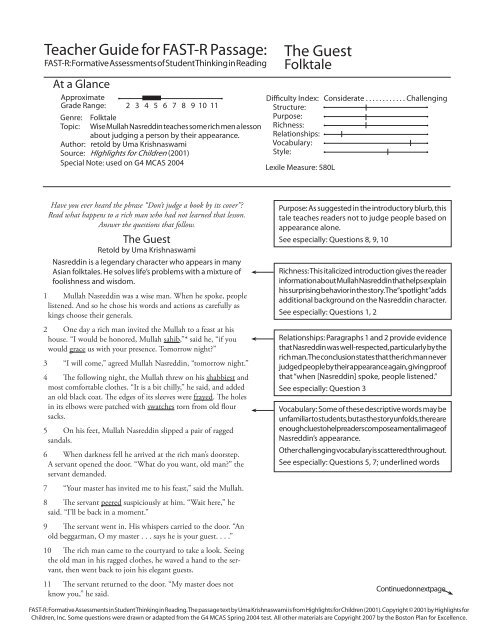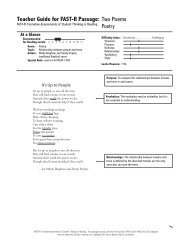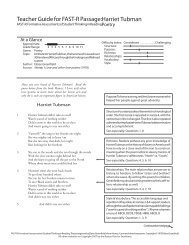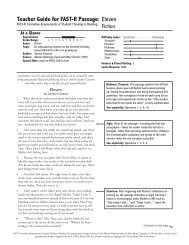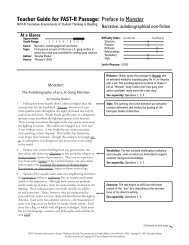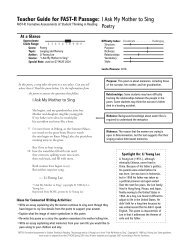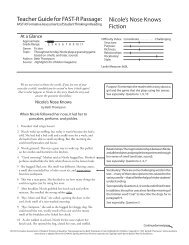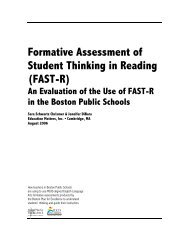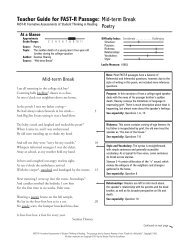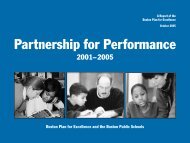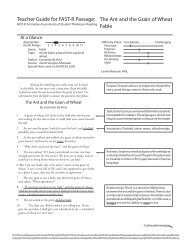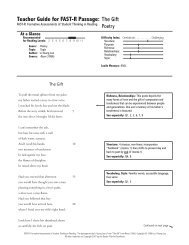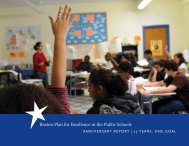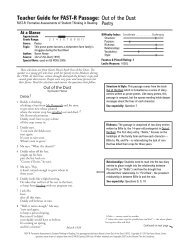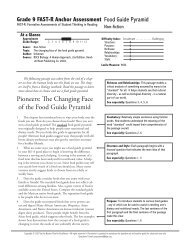Teacher Guide for FAST-R Passage: The Guest - Boston Plan for ...
Teacher Guide for FAST-R Passage: The Guest - Boston Plan for ...
Teacher Guide for FAST-R Passage: The Guest - Boston Plan for ...
You also want an ePaper? Increase the reach of your titles
YUMPU automatically turns print PDFs into web optimized ePapers that Google loves.
<strong>Teacher</strong> <strong>Guide</strong> <strong>for</strong> <strong>FAST</strong>-R <strong>Passage</strong>:<br />
<strong>FAST</strong>-R: Formative Assessments of Student Thinking in Reading<br />
At a Glance<br />
Approximate<br />
Grade Range: 2 3 4 5 6 7 8 9 10 11<br />
Genre:<br />
Topic:<br />
Folktale<br />
Wise Mullah Nasreddin teaches some rich men a lesson<br />
about judging a person by their appearance.<br />
Author: retold by Uma Krishnaswami<br />
Source: HIghlights <strong>for</strong> Children (2001)<br />
Special Note: used on G4 MCAS 2004<br />
<strong>The</strong> <strong>Guest</strong><br />
Folktale<br />
Difficulty Index: Considerate . . . . . . . . . . . . Challenging<br />
Structure:<br />
Purpose:<br />
Richness:<br />
Relationships:<br />
Vocabulary:<br />
Style:<br />
Lexile Measure: 580L<br />
Have you ever heard the phrase “Don’t judge a book by its cover”<br />
Read what happens to a rich man who had not learned that lesson.<br />
Answer the questions that follow.<br />
<strong>The</strong> <strong>Guest</strong><br />
Retold by Uma Krishnaswami<br />
Nasreddin is a legendary character who appears in many<br />
Asian folktales. He solves life’s problems with a mixture of<br />
foolishness and wisdom.<br />
1 Mullah Nasreddin was a wise man. When he spoke, people<br />
listened. And so he chose his words and actions as carefully as<br />
kings choose their generals.<br />
2 One day a rich man invited the Mullah to a feast at his<br />
house. “I would be honored, Mullah sahib,”* said he, “if you<br />
would grace us with your presence. Tomorrow night”<br />
3 “I will come,” agreed Mullah Nasreddin, “tomorrow night.”<br />
4 <strong>The</strong> following night, the Mullah threw on his shabbiest and<br />
most com<strong>for</strong>table clothes. “It is a bit chilly,” he said, and added<br />
an old black coat. <strong>The</strong> edges of its sleeves were frayed. <strong>The</strong> holes<br />
in its elbows were patched with swatches torn from old flour<br />
sacks.<br />
5 On his feet, Mullah Nasreddin slipped a pair of ragged<br />
sandals.<br />
6 When darkness fell he arrived at the rich man’s doorstep.<br />
A servant opened the door. “What do you want, old man” the<br />
servant demanded.<br />
7 “Your master has invited me to his feast,” said the Mullah.<br />
8 <strong>The</strong> servant peered suspiciously at him. “Wait here,” he<br />
said. “I’ll be back in a moment.”<br />
9 <strong>The</strong> servant went in. His whispers carried to the door. “An<br />
old beggarman, O my master . . . says he is your guest. . . .”<br />
10 <strong>The</strong> rich man came to the courtyard to take a look. Seeing<br />
the old man in his ragged clothes, he waved a hand to the servant,<br />
then went back to join his elegant guests.<br />
11 <strong>The</strong> servant returned to the door. “My master does not<br />
know you,” he said.<br />
Purpose: As suggested in the introductory blurb, this<br />
tale teaches readers not to judge people based on<br />
appearance alone.<br />
See especially: Questions 8, 9, 10<br />
Richness: This italicized introduction gives the reader<br />
in<strong>for</strong>mation about Mullah Nasreddin that helps explain<br />
his surprising behavior in the story. <strong>The</strong> “spotlight” adds<br />
additional background on the Nasreddin character.<br />
See especially: Questions 1, 2<br />
Relationships: Paragraphs 1 and 2 provide evidence<br />
that Nasreddin was well-respected, particularly by the<br />
rich man. <strong>The</strong> conclusion states that the rich man never<br />
judged people by their appearance again, giving proof<br />
that “when [Nasreddin] spoke, people listened.”<br />
See especially: Question 3<br />
Vocabulary: Some of these descriptive words may be<br />
unfamiliar to students, but as the story unfolds, there are<br />
enough clues to help readers compose a mental image of<br />
Nasreddin’s appearance.<br />
Other challenging vocabulary is scattered throughout.<br />
See especially: Questions 5, 7; underlined words<br />
Continued on next page<br />
<strong>FAST</strong>-R: Formative Assessments in Student Thinking in Reading. <strong>The</strong> passage text by Uma Krishnaswami is from Highlights <strong>for</strong> Children (2001). Copyright © 2001 by Highlights <strong>for</strong><br />
Children, Inc. Some questions were drawn or adapted from the G4 MCAS Spring 2004 test. All other materials are Copyright 2007 by the <strong>Boston</strong> <strong>Plan</strong> <strong>for</strong> Excellence.
12 “He invited me to his feast,” insisted the Mullah.<br />
13 <strong>The</strong> servant laughed. “Nonsense! Invited you A ragged<br />
old beggar My master’s friends are noblemen and kings. Be off<br />
be<strong>for</strong>e I take a stick to you!”<br />
14 So Mullah Nasreddin went home. He changed into his finest<br />
silk garments. He wore a black woolen vest with silver trim.<br />
He put his best cap on his head and added a handsome highcollared<br />
coat. He sprinkled rose water on his face and hands. He<br />
combed his beard.<br />
15 Smiling to himself, he made his way back to the rich man’s<br />
house and knocked at the door.<br />
Structure: Nasreddin’s second set of preparations and<br />
second trip to the rich man’s house begin here. Readers<br />
should note the contrast in his choice of clothing and<br />
reception by the servant and the rich man.<br />
See especially: Questions 4, 6<br />
16 Once again, the servant opened it. Once again, the Mullah<br />
said, “Your master has invited me to his feast.”<br />
17 This time the servant bowed respectfully and ushered him<br />
in.<br />
18 “Welcome, welcome, Mullah sahib.” And the rich man<br />
himself showed the Mullah to his special seat at the feast.<br />
19 “At last, Mullah sahib,” said the guests. “We have all been<br />
waiting <strong>for</strong> you.”<br />
20 <strong>The</strong> food arrived. “Serve Mullah Nasreddin first,” said the<br />
rich man. <strong>The</strong> Mullah smiled at everyone. <strong>The</strong>n he began to get<br />
busy with his food.<br />
21 But he did not eat.<br />
22 “Hai hai!” cried the guests.<br />
23 “Mullah sahib! What are you doing” cried the rich man.<br />
24 For Mullah Nasreddin had begun to spoon the soup over his<br />
best cap. He crumbled the bread and sprinkled the crumbs over<br />
the shoulders of his handsome highcollared coat. He took apart<br />
the shish kebab and fed it lovingly to his sleeves.<br />
25 <strong>The</strong> rich man’s voice trembled. “Mullah sahib, do you not<br />
like the food”<br />
Style: This tale uses a typical “storytelling voice,” using<br />
rich descriptive vocabulary to paint a scene but leaving<br />
characters’ thoughts and motivations implicit until the<br />
end so the reader experiences the lesson just as the<br />
characters do.<br />
26 In reply, Mullah Nasreddin dribbled the delicate yogurt and<br />
cream sauces over his fine silk garments and best black woolen<br />
vest with silver trim. <strong>The</strong>n he sat back and beamed at everyone.<br />
27 <strong>The</strong>re was a shocked silence. <strong>The</strong>n the rich man said, “O<br />
most respected Mullah Nasreddin, you never do anything without<br />
a reason. Has someone offended you”<br />
28 <strong>The</strong> Mullah replied, “When I arrived in rags, you turned me<br />
away. Now that I am dressed in finery, you treat me with honor.<br />
Clearly it is my clothes you are welcoming and not me. So it is<br />
only fitting that they should eat this delightful food you have<br />
prepared <strong>for</strong> them.”<br />
29 <strong>The</strong> rich man hung his head in shame. He said, “Mullah<br />
sahib, <strong>for</strong>give me. I was blind. I saw only your clothes and could<br />
not recognize the wearer. I will never again judge people by how<br />
they look or by the clothes they wear.” And, in truth, he never<br />
did.<br />
Copyright © 2001 by Highlights <strong>for</strong> Children, Inc., Columbus, Ohio.<br />
Spotlight On: Mullah Nasreddin<br />
Mullah Nasreddin was a real person, a Muslim cleric<br />
who lived in Turkey in the Middle Ages. He was known<br />
<strong>for</strong> being both wise and humorous. During his lifetime,<br />
he often used humor to point out when people—even<br />
rich and powerful people—needed to learn a lesson.<br />
Today, people throughout the Middle East and Asia<br />
tell Nasreddin stories and jokes because his lessons,<br />
like the one the rich man in “<strong>The</strong> <strong>Guest</strong>” learns, are as<br />
valuable today as they were hundreds of years ago.<br />
*Sahib — a respectful title or term of respect<br />
<strong>FAST</strong>-R: Formative Assessments in Student Thinking in Reading. <strong>The</strong> passage text by Uma Krishnaswami is from Highlights <strong>for</strong> Children (2001). Copyright © 2001 by Highlights <strong>for</strong><br />
Children, Inc. Some questions were drawn or adapted from the G4 MCAS Spring 2004 test. All other materials are Copyright 2007 by the <strong>Boston</strong> <strong>Plan</strong> <strong>for</strong> Excellence.
<strong>Teacher</strong> <strong>Guide</strong> <strong>for</strong> <strong>FAST</strong>-R <strong>Passage</strong>:<br />
<strong>FAST</strong>-R: Formative Assessments of Student Thinking in Reading<br />
<strong>The</strong> <strong>Guest</strong><br />
Folktale<br />
<strong>The</strong> annotated answer key below highlights common reasons why students might choose each answer, and the sidebar gives<br />
more insight into the question types, to help you understand patterns of student responses. Always make time to follow up with<br />
students in conferences or small groups to probe their thinking, teach in response to patterns, and help them apply effective reading<br />
and thinking strategies to their everyday reading.<br />
Note: You may find it helpful to refer to the “Types and Levels of Thinking Assessed on <strong>FAST</strong>-R” sheet from your teacher<br />
resource folder as you examine your students’ responses. <strong>The</strong> icon in the right-hand column, below, corresponds to that sheet’s<br />
more detailed explanations of the kinds of thinking each type of question asks of readers.<br />
1. What is the MAIN purpose of paragraph 1<br />
A. to describe the setting of the story (OOB)<br />
B. to explain why the Mullah is like a king (OOP2)<br />
C. to explain why kings choose their generals (OOP1)<br />
D. to describe an important character trait of the Mullah<br />
2. In paragraph 1, the comparison between the care with which Mullah<br />
chooses his words and actions and a king chooses his generals is an<br />
example of<br />
A. a fairy tale. (OOP2)<br />
B. a simile.<br />
C. a metaphor. (OOP1)<br />
D. a theme. (OOP2)<br />
3. Why does the rich man in the story MOST LIKELY invite the Mullah to the<br />
feast<br />
A. <strong>The</strong> rich man needs advice. (OOP1)<br />
B. <strong>The</strong> rich man admires the Mullah.<br />
C. <strong>The</strong> rich man wants everyone in the village to come. (OOP2)<br />
D. <strong>The</strong> rich man needs help preparing delightful food. (OOB)<br />
4. Who is the “ragged old beggar” in paragraph 13<br />
A. the rich man (OOP2)<br />
B. Mullah Nasreddin<br />
C. the servant (OOP2)<br />
D. the narrator (OOB)<br />
5. Reread the following sentence from paragraph 24.<br />
He took apart the shish kebab and fed it lovingly to his sleeves.<br />
MI2: Determine a single<br />
implicit meaning from<br />
the total of a particular<br />
paragraph<br />
MI5: Determine meaning<br />
by using an understanding of<br />
literary concepts<br />
MI1: Determine implicit<br />
meaning from words in<br />
context<br />
FE2: Recognize the explicit<br />
meaning from varied<br />
wording in the text<br />
FE2: Recognize the explicit<br />
meaning from varied<br />
wording in the text<br />
According to the sentence above, Mullah Nasreddin is<br />
A. eating his dinner feast. (OOP2)<br />
B. feeding his pets with the food. (OOB)<br />
C. putting his food on his clothes.<br />
D. giving his food to the servants. (OOP2)<br />
<strong>FAST</strong>-R: Formative Assessments in Student Thinking in Reading. <strong>The</strong> passage text by Uma Krishnaswami is from Highlights <strong>for</strong> Children (2001). Copyright © 2001 by Highlights <strong>for</strong><br />
Children, Inc. Some questions were drawn or adapted from the G4 MCAS Spring 2004 test. All other materials are Copyright 2007 by the <strong>Boston</strong> <strong>Plan</strong> <strong>for</strong> Excellence.
Grades 4-5 • Folktale • “<strong>The</strong> <strong>Guest</strong>”<br />
6. Which detail is the FIRST clue that Mullah Nasreddin planned to teach the<br />
rich man a lesson<br />
A. He told the servant, “Your master invited me to his feast.” (OOP1)<br />
B. He combed his beard. (OOP1)<br />
C. He smiled to himself as he returned to the man’s house in his fancy<br />
clothes.<br />
D. He spooned soup over his best cap. (OOP1)<br />
7. In paragraph 28, the word “finery” means<br />
A. stolen goods. (OOB)<br />
B. very nice clothes.<br />
C. excellent food. (OOP2)<br />
D. judge’s robes. (OOP2)<br />
8. In paragraph 28, what does the Mullah mean when he says, “Clearly it is my<br />
clothes you are welcoming and not me”<br />
A. He means that the rich man likes to wear fine clothes. (OOB)<br />
B. He means that the rich man accepts him only in his finest silk garments<br />
but not when he is dressed in his shabbiest and most com<strong>for</strong>table<br />
clothes.<br />
C. He means that the guests like to dress nicely. (OOB)<br />
D. He means that the guests are very rude to him. (OOP2)<br />
9. What does the rich man mean in paragraph 29 when he says he was<br />
“blind”<br />
A. He has lost the ability to see. (OOP2)<br />
B. He recently got glasses. (OOB)<br />
C. He had not recognized Mullah Nasreddin.<br />
D. He had not seen the man in rags. (OOP2)<br />
10. What is the MOST important lesson the rich man learns in this story<br />
A. Clumsiness should be avoided. (OOB)<br />
B. Servants should be told to be kind. (OOP2)<br />
C. Do not be rude to a wise man. (OOP1)<br />
D. Do not judge people on their appearance alone.<br />
MI3: Determine implicit<br />
meaning by understanding<br />
the organization of<br />
in<strong>for</strong>mation in the text<br />
MI1: Determine implicit<br />
meaning from words in<br />
context<br />
FE2: Recognize the explicit<br />
meaning from varied<br />
wording in the text<br />
MI1: Determine implicit<br />
meaning from words in<br />
context<br />
MI1: Determine implicit<br />
meaning from words in<br />
context<br />
<strong>FAST</strong>-R: Formative Assessments in Student Thinking in Reading. <strong>The</strong> passage text by Uma Krishnaswami is from Highlights <strong>for</strong> Children (2001). Copyright © 2001 by Highlights <strong>for</strong><br />
Children, Inc. Some questions were drawn or adapted from the G4 MCAS Spring 2004 test. All other materials are Copyright 2007 by the <strong>Boston</strong> <strong>Plan</strong> <strong>for</strong> Excellence.
<strong>FAST</strong>-R<br />
+<br />
Formative Assessments of Student Thinking in Reading<br />
Name<br />
“<strong>The</strong> <strong>Guest</strong>” • Folktale<br />
Date<br />
<strong>Teacher</strong>/Class<br />
Have you ever heard the phrase “Don’t judge a book by its cover” Read what happens to a rich man<br />
who had not learned that lesson. Answer the questions that follow.<br />
Nasreddin is a legendary character<br />
who appears in many Asian folktales. He solves<br />
life’s problems with a mixture of foolishness and<br />
wisdom.<br />
1 Mullah Nasreddin was a wiseman.<br />
When he spoke, people listened. And so he<br />
chose his words and actions as carefully as<br />
kings choose their generals.<br />
2 One day a rich man invited the Mullah<br />
to a feast at his house. “I would be<br />
honored, Mullah sahib,”* said he, “if you<br />
would grace us with your presence. Tomorrow<br />
night”<br />
3 “I will come,” agreed Mullah Nasreddin,<br />
“tomorrow night.”<br />
4 <strong>The</strong> following night, the Mullah threw<br />
on his shabbiest and most com<strong>for</strong>table<br />
clothes. “It is a bit chilly,” he said, and<br />
added an old black coat. <strong>The</strong> edges of its<br />
sleeves were frayed. <strong>The</strong> holes in its elbows<br />
were patched with<br />
swatches torn from old<br />
flour sacks.<br />
5 On his feet, Mullah<br />
Nasreddin slipped a pair<br />
of ragged sandals.<br />
6 When darkness fell<br />
he arrived at the rich<br />
man’s doorstep. A servant<br />
opened the door. “What<br />
do you want, old man”<br />
the servant demanded.<br />
*sahib — a respectful title or term of respect<br />
<strong>The</strong> <strong>Guest</strong><br />
Retold by Uma Krishnaswami<br />
Spotlight On: Mullah Nasreddin<br />
Mullah Nasreddin was a real person, a<br />
Muslim cleric who lived in Turkey in the Middle<br />
Ages. He was known <strong>for</strong> being both wise and<br />
humorous. During his lifetime, he often used<br />
humor to point out when people—even rich and<br />
powerful people—needed to learn a lesson.<br />
Today, people throughout the Middle East<br />
and Asia tell Nasreddin stories and jokes<br />
because his lessons, like the one of the rich<br />
man in “<strong>The</strong> <strong>Guest</strong>” learns, are as valuable<br />
today as they were hundreds of years ago.<br />
7 “Your master has invited me to his<br />
feast,” said the Mullah.<br />
8 <strong>The</strong> servant peered suspiciously at him.<br />
“Wait here,” he said. “I’ll be back in a moment.”<br />
9 <strong>The</strong> servant went in. His whispers carried<br />
to the door. “An old beggarman, O my<br />
master . . . says he is your guest. . . .”<br />
10 <strong>The</strong> rich man came to the courtyard<br />
to take a look. Seeing the old man in his<br />
ragged clothes, he waved a hand to the<br />
servant, then went back to join his elegant<br />
guests.<br />
11 <strong>The</strong> servant returned to the door. “My<br />
master does not know you,” he said.<br />
12 “He invited me to his feast,” insisted the<br />
Mullah.<br />
13 <strong>The</strong> servant laughed. “Nonsense! Invited<br />
you A ragged old beggar My master’s<br />
friends are noblemen and<br />
kings. Be off be<strong>for</strong>e I take a<br />
stick to you!”<br />
14 So Mullah Nasreddin<br />
went home. He changed into<br />
his finest silk garments. He<br />
wore a black woolen vest<br />
with silver trim. He put his<br />
best cap on his head and<br />
added a handsome high-collared<br />
coat. He sprinkled rose<br />
Continued on the next page<br />
<strong>FAST</strong>-R: Formative Assessments in Student Thinking in Reading. <strong>The</strong> passage text by Uma Krishnaswami is from Highlights <strong>for</strong> Children (2001). Copyright © 2001 by Highlights <strong>for</strong><br />
Children, Inc. Some questions were drawn or adapted from the G4 MCAS Spring 2004 test. All other materials are Copyright 2007 by the <strong>Boston</strong> <strong>Plan</strong> <strong>for</strong> Excellence.
water on his face and hands. He combed<br />
his beard.<br />
15 Smiling to himself, he made his way<br />
back to the rich man’s house and knocked<br />
at the door.<br />
16 Once again, the servant opened it.<br />
Once again, the Mullah said, “Your master<br />
has invited me to his feast.”<br />
17 This time the servant bowed respectfully<br />
and ushered him in.<br />
18 “Welcome, welcome, Mullah sahib.”<br />
And the rich man himself showed the Mullah<br />
to his special seat at the feast.<br />
19 “At last, Mullah sahib,” said the<br />
guests. “We have all been waiting <strong>for</strong><br />
you.”<br />
20 <strong>The</strong> food arrived. “Serve Mullah<br />
Nasreddin first,” said the rich man. <strong>The</strong><br />
Mullah smiled at everyone. <strong>The</strong>n he began<br />
to get busy with his food.<br />
21 But he did not eat.<br />
22 “Hai hai!” cried the guests.<br />
23 “Mullah sahib! What are you doing”<br />
cried the rich man.<br />
24 For Mullah Nasreddin had begun to<br />
spoon the soup over his best cap. He crumbled<br />
the bread and sprinkled the crumbs<br />
over the shoulders of his handsome highcollared<br />
coat. He took apart the shish<br />
kebab and fed it lovingly to his sleeves.<br />
25 <strong>The</strong> rich man’s voice trembled. “Mullah<br />
sahib, do you not like the food”<br />
26 In reply, Mullah Nasreddin dribbled the<br />
delicate yogurt and cream sauces over his<br />
fine silk garments and best black woolen<br />
vest with silver trim. <strong>The</strong>n he sat back and<br />
beamed at everyone.<br />
27 <strong>The</strong>re was a shocked silence. <strong>The</strong>n the<br />
rich man said, “O most respected Mullah<br />
Nasreddin, you never do anything without a<br />
reason. Has someone offended you”<br />
28 <strong>The</strong> Mullah replied, “When I arrived in<br />
rags, you turned me away. Now that I am<br />
dressed in finery, you treat me with honor.<br />
Clearly it is my clothes you are welcoming<br />
and not me. So it is only fitting that they<br />
should eat this delightful food you have prepared<br />
<strong>for</strong> them.”<br />
29 <strong>The</strong> rich man hung his head in shame.<br />
He said, “Mullah sahib, <strong>for</strong>give me. I was<br />
blind. I saw only your clothes and could<br />
not recognize the wearer. I will never again<br />
judge people by how they look or by the<br />
clothes they wear.” And, in truth, he never<br />
did.<br />
<strong>FAST</strong>-R: Formative Assessments in Student Thinking in Reading. <strong>The</strong> passage text by Uma Krishnaswami is from Highlights <strong>for</strong> Children (2001). Copyright © 2001 by Highlights <strong>for</strong><br />
Children, Inc. Some questions were drawn or adapted from the G4 MCAS Spring 2004 test. All other materials are Copyright 2007 by the <strong>Boston</strong> <strong>Plan</strong> <strong>for</strong> Excellence.
<strong>FAST</strong>-R<br />
+<br />
Formative Assessments of Student Thinking in Reading<br />
Name<br />
“<strong>The</strong> <strong>Guest</strong>” • Folktale<br />
Date<br />
<strong>Teacher</strong>/Class<br />
Directions: Answer these questions by filling in the circle <strong>for</strong> the best answer on your answer sheet.<br />
1. What is the MAIN purpose of paragraph 1<br />
A. to describe the setting of the story<br />
B. to explain why the Mullah is like a king<br />
C. to explain why kings choose their generals<br />
D. to describe an important character trait of the Mullah<br />
2. In paragraph 1, the comparison between the care with which Mullah chooses his words and actions<br />
and a king chooses his generals is an example of<br />
A. a fairy tale.<br />
B. a simile.<br />
C. a metaphor.<br />
D. a theme.<br />
3. Why does the rich man in the story MOST LIKELY invite the Mullah to the feast<br />
A. <strong>The</strong> rich man needs advice.<br />
B. <strong>The</strong> rich man admires the Mullah.<br />
C. <strong>The</strong> rich man wants everyone in the village to come.<br />
D. <strong>The</strong> rich man needs help preparing delightful food.<br />
4. Who is the “ragged old beggar” in paragraph 13<br />
A. the rich man<br />
B. Mullah Nasreddin<br />
C. the servant<br />
D. the narrator<br />
5. Reread the following sentence from paragraph 24.<br />
He took apart the shish kebab and fed it lovingly to his sleeves.<br />
According to the sentence above, Mullah Nasreddin is<br />
A. eating his dinner feast.<br />
B. feeding his pets with the food.<br />
C. putting his food on his clothes.<br />
D. giving his food to the servants.<br />
<strong>FAST</strong>-R: Formative Assessments in Student Thinking in Reading. <strong>The</strong> passage text by Uma Krishnaswami is from Highlights <strong>for</strong> Children (2001). Copyright © 2001 by Highlights <strong>for</strong><br />
Children, Inc. Some questions were drawn or adapted from the G4 MCAS Spring 2004 test. All other materials are Copyright 2007 by the <strong>Boston</strong> <strong>Plan</strong> <strong>for</strong> Excellence.
Name<br />
Date<br />
School<br />
<strong>Teacher</strong>/Class<br />
6. Which detail is the FIRST clue that Mullah Nasreddin planned to teach the rich man a lesson<br />
A. He told the servant, “Your master invited me to his feast.”<br />
B. He combed his beard.<br />
C. He smiled to himself as he returned to the man’s house in his fancy clothes.<br />
D. He spooned soup over his best cap.<br />
7. In paragraph 28, the word “finery” means<br />
A. stolen goods.<br />
B. very nice clothes.<br />
C. excellent food.<br />
D. judge’s robes.<br />
8. In paragraph 28, what does the Mullah mean when he says, “Clearly it is my clothes you are<br />
welcoming and not me”<br />
A. He means that the rich man likes to wear fine clothes.<br />
B. He means that the rich man does not accept him in old clothes.<br />
C. He means that the guests like to dress nicely.<br />
D. He means that the guests are very rude to him.<br />
9. What does the rich man mean in paragraph 29 when he says he was “blind”<br />
A. He has lost the ability to see.<br />
B. He recently got glasses.<br />
C. He had not recognized Mullah Nasreddin.<br />
D. He had not seen the man in rags.<br />
10. What is the MOST important lesson the rich man learns in this story<br />
A. Clumsiness should be avoided.<br />
B. Servants should be told to be kind.<br />
C. Do not be rude to a wise man.<br />
D. Do not judge people on their appearance alone.<br />
<strong>FAST</strong>-R: Formative Assessments in Student Thinking in Reading. <strong>The</strong> passage text by Uma Krishnaswami is from Highlights <strong>for</strong> Children (2001). Copyright © 2001 by Highlights <strong>for</strong><br />
Children, Inc. Some questions were drawn or adapted from the G4 MCAS Spring 2004 test. All other materials are Copyright 2007 by the <strong>Boston</strong> <strong>Plan</strong> <strong>for</strong> Excellence.
<strong>Teacher</strong>s: Please duplicate and use this answer sheet only <strong>for</strong> students <strong>for</strong> whom you did not receive a pre-printed answer sheet!<br />
<strong>FAST</strong>-R Answer Sheet<br />
Name<br />
School<br />
Date Grade Class<br />
<strong>Passage</strong> Title<br />
Completely fill the circle<br />
<strong>for</strong> the correct answer.<br />
<strong>Teacher</strong> Name<br />
Write your answer to the open response prompt in the lined space below<br />
if your teacher directs you to do so.<br />
1. A B C D<br />
2. A B C D<br />
3. A B C D<br />
4. A B C D<br />
5. A B C D<br />
6. A B C D<br />
7. A B C D<br />
8. A B C D<br />
9. A B C D<br />
10. A B C D<br />
OFFICE USE ONLY<br />
RESEARCH: Y N<br />
OPEN RESPONSE: 1 2 3 4


